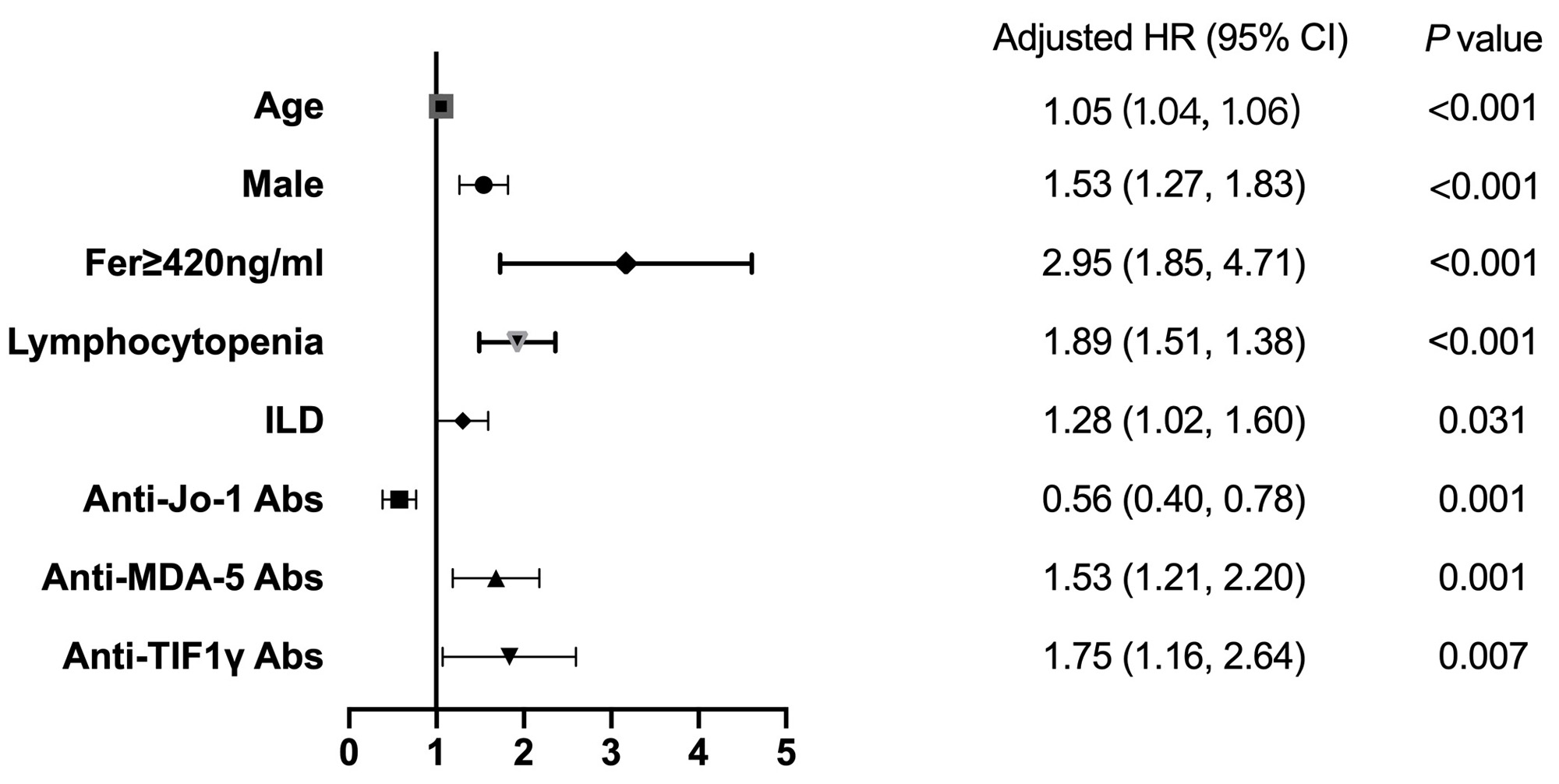Session Information
Date: Monday, November 13, 2023
Title: (1155–1182) Muscle Biology, Myositis & Myopathies – Basic & Clinical Science Poster II
Session Type: Poster Session B
Session Time: 9:00AM-11:00AM
Background/Purpose: Our study depicted the mortality and independent risk factors of IIM patients in a large multi-center prospective registry cohort in China.
Methods: Patients registered before 31st, December 2021 in the Chinese Rheumatism Data Center-Myositis Registry (CRDC-MYO) were included. Juvenile patients, patients with malignancy at baseline, or patients complicated with other CTD were excluded. Baseline and follow-up data were collected from CRDC-MYO registry database. Death information was obtained from the Chinese Center for Disease Control and Prevention’s disease surveillance points system. Kaplan-Meier Curves and Log-rank test was used to compare the mortality. Univariable and multivariable Cox hazards regression analysis were used to identify potential risk factors for death.
Results: 4534 IIM cases were finally enrolled, including 2902 dermatomyositis (64.0%), 592 polymyositis (13.1%), 927 antisynthetase syndrome (20.4%), and 113 immune-mediated necrotising myopathy (2.5%). 510 deaths in total were recorded. The cumulative survival at 1, 3, 5 and 10 years were 92.6%, 88.6%, 86.2%, and 80.5% (Figure 1a). Significant differences (P< 0.05) in survival between different subgroups (Figure 1b) as well as different myositis-specific antibodies were confirmed by log-rank test (Figure 1c). Malignancy (18.8%), interstitial lung disease (18.8%), cardiovascular diseases (18.8%), and infections (18.6%) were the most common causes of deaths (Figure 2a). We observed a shift in the predominant causes of death from pulmonary interstitial disease and infection within the initial three-year period to tumor and cardiovascular diseases in the subsequent years as the follow-up time extended (Figure 2b). There is significant variation in the composition of causes of death among myositis patients with different antibodies (Figure 2c). Patients with positive anti-TIF1γ antibody commonly succumb to malignancies, whereas patients with positive anti-MDA5 antibody and anti-Jo-1 antibody frequently experience mortality due to interstitial lung disease. Multivariable Cox regression analysis confirmed male (HR=1.53, 95%CI 1.27-1.83), ferritin≥420ng/ml (2.95 [1.85-4.71]), lymphocytopenia (1.89 [1.51-1.38]), ILD (1.28 [1.02-1.60]), anti-MDA-5 antibody (1.53 [1.21-2.20]), and anti-TIF1γ antibody (1.75 [1.16-2.64]) as independent risk factors, and anti-Jo-1 antibody (0.56 [0.40-0.78]) as protective factor for mortality after adjusting for age (Figure 3).
Conclusion: Patients with positive anti-MDA5 antibody exhibited the most rapid decline in survival rate during the first year, whereas patients with anti-TIF1γ antibody had a worse prognosis over a longer follow-up period. This might be attributed to the fact that causes of mortality among myositis patients vary over time, with anti-TIF1γ-positive patients being more susceptible to malignancies. In addition to interstitial lung disease, myositis-specific antibodies appeared to exert a more decisive influence on the prognosis of myositis patients compared to other clinical manifestations. This suggests that future classification of myositis patients based on myositis-specific antibodies might be more rational.
To cite this abstract in AMA style:
Peng L, Yin P, Li M, Wang Q, wang Y, Zhou S, wu c, zhao J, xu D, Li M, Zeng x. All-cause Mortality and Risk Factors for Death in a Large Multi-center Prospective Registry Cohort of Idiopathic Inflammatory Myositis in China [abstract]. Arthritis Rheumatol. 2023; 75 (suppl 9). https://acrabstracts.org/abstract/all-cause-mortality-and-risk-factors-for-death-in-a-large-multi-center-prospective-registry-cohort-of-idiopathic-inflammatory-myositis-in-china/. Accessed .« Back to ACR Convergence 2023
ACR Meeting Abstracts - https://acrabstracts.org/abstract/all-cause-mortality-and-risk-factors-for-death-in-a-large-multi-center-prospective-registry-cohort-of-idiopathic-inflammatory-myositis-in-china/



